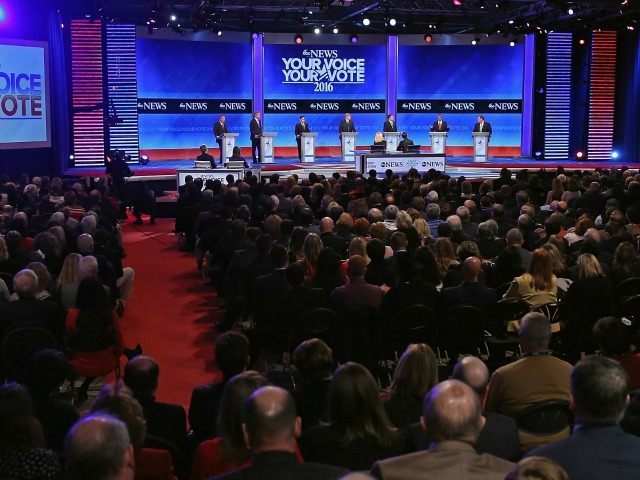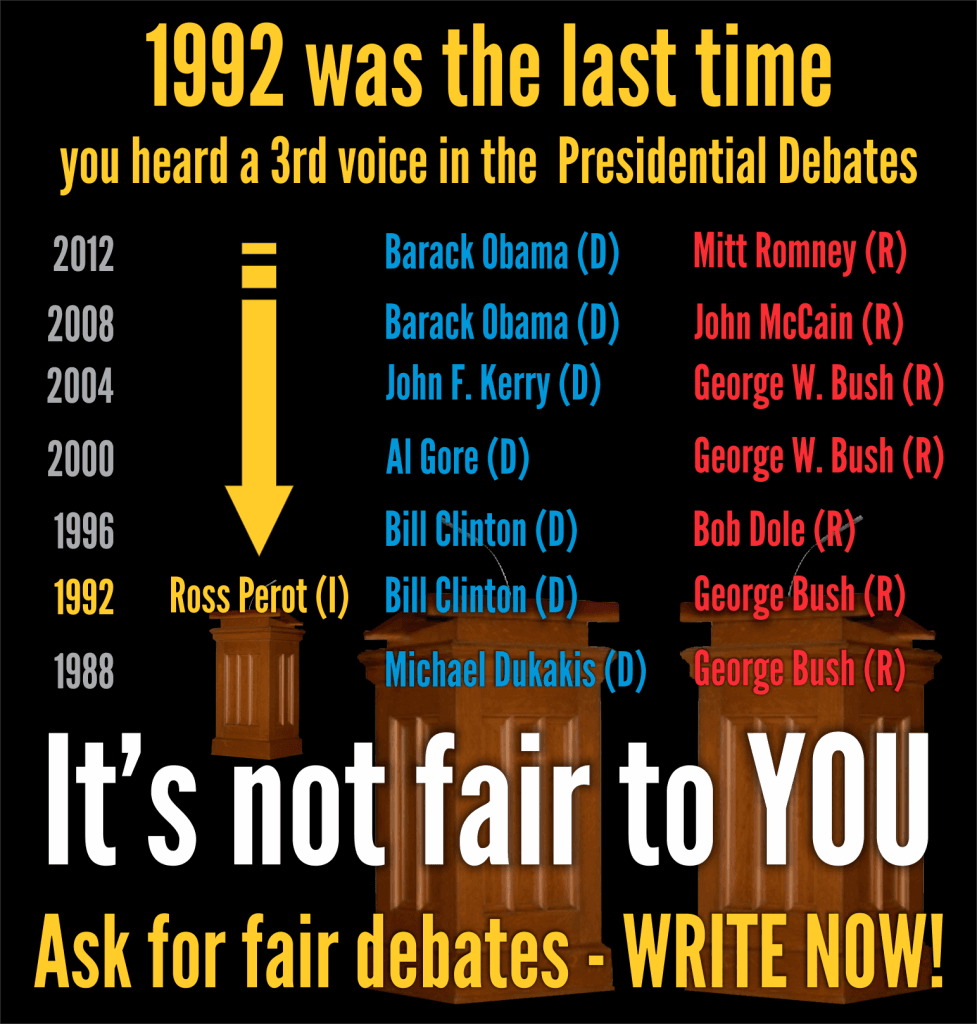Result of
Third-Party Lawsuit Could Decide Outcome of 2016 Election
by Jason Scheurer 7 Mar 2016
A lawsuit
filed on September 26, 2015 in Washington D.C. (and its eventual outcome) may
turn out to be the most important event of the 2016
presidential election.
Virtually ignored by all but a handful of alternative
media outlets, this suit has the power to destroy the existing political power
structure ─ much like the ridesharing firms, Uber and Lyft, threaten the
antiquated taxi industry. If successful, it will permanently expand the number
of candidates on the debate stage during the general election by proving that
the Commission
on Presidential Debates is in violation of current anti-trust law.
Politics is not just free speech; it’s also big business.
In a nation that prides itself on choice, with endless
varieties of almost anything imaginable, why are we limited to hearing from
just Republicans and Democrats when debating our nation’s future? The reason is
that you, as a citizen, are being subconsciously herded under the guise of
“preventing confusion.”
Libertarians, Greens, Reform, Constitutional, and
Independents are allowed, to a point, to voice their issues, but the most
important qualifier has always been the official debate stage. Inclusion
on this stage is, in effect, the social proof that says to the American voter:
this candidate is for real and should be considered.
National debates, being the most important forum to
present a candidate’s ideas to the American voter, have the most restrictive
qualifiers for inclusion. These qualifiers are conveniently set by Republicans
and Democrats masquerading as unbiased arbiters. These biased members are
deciding the rules, rather than using an independent organization like the
League of Women Voters, because they fear competition.
The existing debate rules state that a presidential
candidate must “have a level of support of at least 15% (fifteen percent) of
the national electorate as determined by five national public opinion polling
organizations selected by CPD, using the average of those organizations’ most
recent publicly-reported results at the time of the determination.” This
15-percent hurtle leaves out important criteria, such as how polls should be
worded, which polling organizations will be used, and when these polls should
be taken. Cherry picking polling companies and adjusting the timing are just a
few ways to tilt the outcome.
More significant to the discussion is that the Commission
fails to address the most vital element, which is that polls are becoming
increasingly unreliable each year in the cell phone age. Polling has become so
untrustworthy that renowned pollster, Gallup,
is getting out of the presidential polling business because it
admits it can’t get accurate results. If an organization such as Gallup is
throwing in the towel, then the reliability of every poll is in
question.
In the 2012 election, Libertarian Gary Johnson and Green
Party candidate Jill Stein were not included in approximately 90 percent of the
popular polls. Most of the time, these polls used “none of the above” or
“someone else” rather than disclosing their names, even though they were listed
on the ballot. The average voter would be hard pressed to find any poll that
covered third parties in any meaningful way.
If a candidate is running, but the media is not
covering them, are they really running?
Republicans and Democrats may not agree on much, but
there is no dispute between them that only their two parties should be
competing for Americans’ votes. The political establishments in both major
parties do everything within their power to squash nontraditional viewpoints.
Voter suppression is not about a 98-year-old black
woman in Mississippi without a driver’s license; it is about restrictive laws
(written by Republicans and Democrats) to prevent anyone but their respective
parties from ever showing up on the ballot. Numerous ballot access laws act as
barriers to entry but are sold to the public as a way of bringing order and
preventing confusion. It sounds fair but, in reality, is far from it. This
lawsuit hopes to rectify some of these injustices.
The same common excuses that are routinely given are
conveniently overlooked when the primary field is crowded with establishment
candidates. The first few Republican debates had 10 candidates on the debate
stage at one time; the latest one had four. So much for that “confusion”
excuse. The Republican primary season has proven that the public, the
moderators, and the audience can handle multiple candidates. The reasons given
in the past have been exposed to be nothing more than a political red herring.
The book Freakanomics makes it clear that money
means less than people think, especially when there are more than
two candidates on the ballot. Jeb Bush, despite burning through $130
million dollars on his campaign, has nothing to show for it. In a
race with three or more candidates, the influence of cash decreases
exponentially for the two larger candidates. Media coverage, above all else,
drives the election. The 24/7 Trump coverage has trumped even the big money
insider machine; just ask Jeb. How could any candidate, no matter how wealthy,
afford ad buys equal to the hours upon hours of free and incessant analyzation
by talking heads in media?
Much like Coke and Pepsi control the shelf space at the
supermarket, the two main political players operate to stigmatize, marginalize,
and discredit anyone but themselves. Now that it appears Trump may have locked
up the nomination for the Republican Party, insiders are looking at ways to
mount a third-party run–and are coming to realize that their own rules have
made it next to impossible to win. The irony is that their rigged system is
backfiring as they scramble for some means to run a possible alternative
candidate of their own.
The recent decision by candidate Sen. Bernie Sanders
(I-VT) 16% to run as a Democrat, rather than a Democratic Socialist,
was made primarily because both major parties would have never allowed him to
participate in the final debates, even though his supporters currently number
in the millions. He knows the election game is rigged and has said so
repeatedly throughout the years. His ultimate decision to work within the
Democrat party, rather than go it alone, is just further proof that the deck is
stacked against outsiders.
What is so wrong with offering the American people
another choice─having outside candidates sharing the stage with Republicans and
Democrats? Ultimately, it comes down to the issue of control by the
behind-the-scenes power brokers. The smaller the number of choices, the easier
it is to control the game.
What would happen if the anti-war left are presented with
an alternative to war hawk
Hilary Clinton? Where
do free market capitalists go when Donald Trump backs ethanol and high tariffs?
What happens when voters go to websites like isidewith.com
and find out that who they side with is not even a Republican or a Democrat?
The answer is, quite frankly, sheer panic amongst the political class.
The presidential debate lawsuit, if successful, will
rewrite the political playbook going forward and seriously impair the political
establishment’s ability to suppress third parties from gaining greater
exposure. Most voters are already considered
to be Independents, and the expansion of coverage from the national
televised debates will hopefully reengage the 50 percent of the population who
choose not to vote each election cycle. Dissatisfied with what is being offered
from the major parties, the appeal of Libertarians and Greens, in particular,
looks more attractive by the day. This year will likely show record turnout for
these parties’ candidates. The true risk to the political establishment is that
a defection of just a handful of former Republicans or Democrats could shift
the political balance of power in ways no computer model has ever considered.
The question now is: just how many traditional voters will make the leap
to a third party?
Commission on Presidential Debates
William J. Clinton
is an honorary co-chair for the Commission
on Presidential Debates, married to Hillary
Rodham Clinton, an adviser for the 2016
Hillary Rodham Clinton presidential campaign, and the founder of the Bill, Hillary & Chelsea Clinton
Foundation.
Note: Hillary Rodham
Clinton is married to William J.
Clinton, the candidate for the 2016
Hillary Rodham Clinton presidential campaign, and was a director at the Bill, Hillary & Chelsea Clinton
Foundation.
Open
Society Foundations was a funder for the Bill, Hillary & Chelsea Clinton Foundation, and the Carnegie
Endowment for International Peace (think tank).
George
Soros is the founder & chairman for the Open Society Foundations, a co-chair, national finance council for
the Ready PAC (Ready For Hillary), a
director emeritus for Refugees
International, and was the chairman for the Foundation to Promote Open
Society.
Ready
PAC (Ready For Hillary)
supported the 2016 Hillary Rodham
Clinton presidential campaign.
Foundation
to Promote Open Society was a funder for the Carnegie Endowment for
International Peace (think tank), Refugees
International, and the Millennium
Promise.
Jessica Tuchman Mathews was the president of
the Carnegie Endowment for International Peace (think tank), is a
director at the Nuclear Threat
Initiative (think tank), a director at the American Friends of Bilderberg
(think tank), and a 2008 Bilderberg conference participant (think tank).
Ed Griffin’s interview with Norman Dodd in 1982
(The investigation into the Carnegie Endowment for
International Peace uncovered the plans for population control by involving the
United States
in war)
Shirley M.
Tilghman is a trustee at the Carnegie Endowment for International Peace
(think tank), and a director at the Commission
on Presidential Debates.
Carnegie
Endowment for International Peace (think
tank) was a funder for the Nuclear
Threat Initiative (think tank).
Warren E. Buffett
is an adviser at the Nuclear Threat
Initiative (think tank), and Howard
G. Buffett’s father.
Howard G. Buffett
is Warren E. Buffett’s son, and a director
at the Commission on Presidential
Debates.
John C. Danforth
is a director at Refugees International,
and a director at the Commission on
Presidential Debates.
Dale Mathias is a
director at Refugees International,
and an advisory board member for Unity08.
Sam Waterston is
a director at Refugees International,
and an advisory board member for Unity08.
Hamilton Jordan was
a director at Unity08, and a co-campaign
manager for the 1992 Ross Perot
presidential campaign.
H. Ross Perot Sr.
was the candidate for the 1992 Ross
Perot presidential campaign.
Jimmy
Carter was an honorary co-chairman for the Millennium Promise, and is an honorary co-chair for the Commission on Presidential Debates.
John I. Jenkins
was a director at the Millennium Promise,
and is a director at the Commission on
Presidential Debates.
William J. Clinton
is an honorary co-chair for the Commission
on Presidential Debates, married to Hillary
Rodham Clinton, an adviser for the 2016
Hillary Rodham Clinton presidential campaign, and the founder of the Bill, Hillary & Chelsea Clinton
Foundation.
Coca-Cola
Company was a funder for the Bill,
Hillary & Chelsea Clinton Foundation.
PepsiCo, Inc. was
a funder for the Bill, Hillary &
Chelsea Clinton Foundation.
Karl M. von
der Heyden was the vice chairman for PepsiCo,
Inc., and a director at DreamWorks
Animation SKG Inc.
Mellody L. Hobson
is the chairman for DreamWorks Animation
SKG Inc., and a member of the Commercial
Club of Chicago.
Commercial Club of Chicago, Members Directory A-Z (Past Research)
Tuesday, December 17, 2013
Richard M. Daley
is a member of the Commercial Club of
Chicago, and a director at the Coca-Cola
Company.
R. Eden Martin is
the president of the Commercial Club of
Chicago, and counsel at Sidley
Austin LLP.
Michelle Obama
was a lawyer at Sidley Austin LLP.
Barack
Obama was an intern at Sidley Austin
LLP.
Newton N. Minow is
a senior counsel at Sidley Austin LLP,
a member of the Commercial Club of
Chicago, and a director at the Commission
on Presidential Debates.
Howard G. Buffett
is a director at the Commission on
Presidential Debates, Warren E.
Buffett’s son, and a director at the Coca-Cola
Company.
Warren E. Buffett
is Howard G. Buffett’s father, an
adviser at the Nuclear Threat Initiative
(think tank), and was a director at the Coca-Cola Company.
Carnegie
Endowment for International Peace (think
tank) was a funder for the Nuclear
Threat Initiative (think tank).
Shirley M.
Tilghman is a trustee at the Carnegie Endowment for International Peace
(think tank), and a director at the Commission
on Presidential Debates.






No comments:
Post a Comment